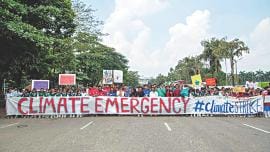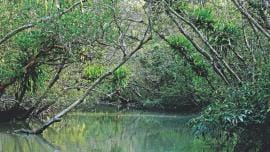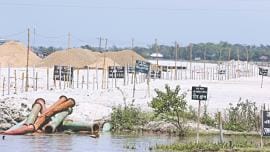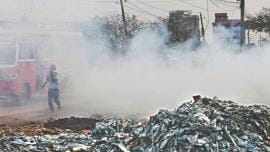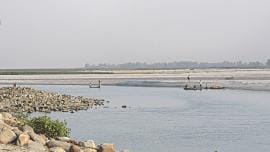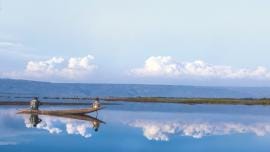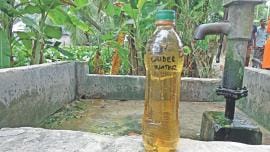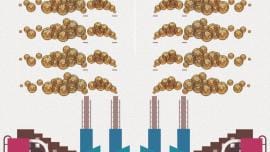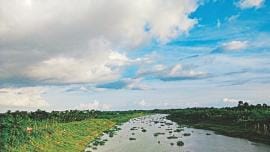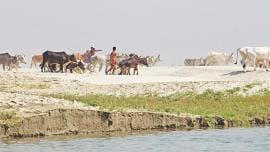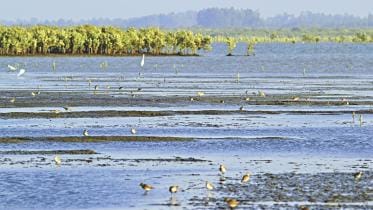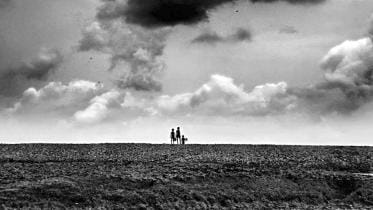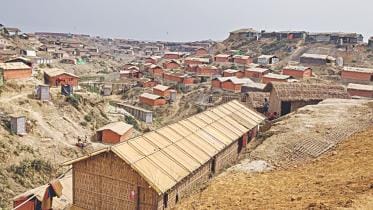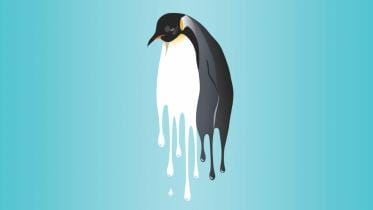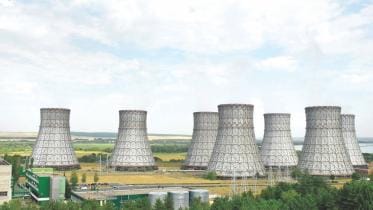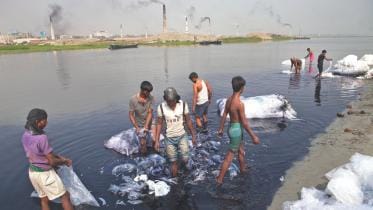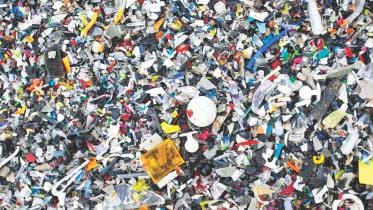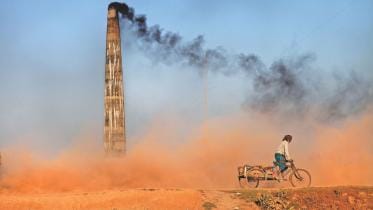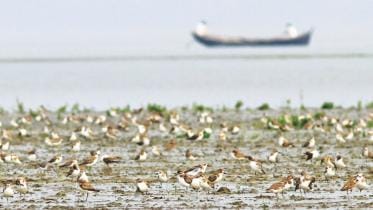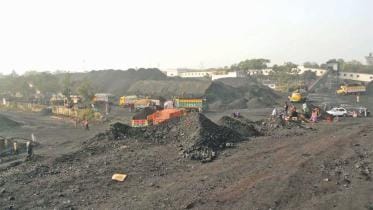When teens of the world unite for Planet Earth
26 September 2019, 18:00 PM
Star Weekend
Was that you Akela?
19 September 2019, 18:00 PM
Star Weekend
ENVIRONMENT / Can our mangroves survive the impulse to industrialise?
5 September 2019, 18:00 PM
Star Weekend
The dust-laden air of Dhaka
4 April 2019, 18:00 PM
Star Weekend
Teesta / The Vanishing Fishermen of Teesta
4 April 2019, 18:00 PM
Star Weekend
Technology at Tanguar Haor
14 March 2019, 18:00 PM
Star Weekend
Environment / The water business in the south west of Bangladesh
28 February 2019, 18:00 PM
Star Weekend
Putting a price tag on climate change
17 January 2019, 18:00 PM
Star Weekend
Environment / The water benders of Satkhira
20 December 2018, 18:00 PM
Star Weekend
Let the rivers run wild
13 December 2018, 18:00 PM
Star Weekend
When teens of the world unite for Planet Earth
Just a day after teenagers around the world skipped classes and gathered on the streets of Dhaka, Warwick, Hamburg, London, and
26 September 2019, 18:00 PM
Was that you Akela?
In Rudyard Kipling’s The Jungle Book, a series of short fables published in 1894, Akela and Raksha were the wolf parents of Mowgli,
19 September 2019, 18:00 PM
Can our mangroves survive the impulse to industrialise?
On August 24, 2017, the High Court directed the Bangladesh government not to approve any industry activity within 10 kilometres of the Sundarbans area.
5 September 2019, 18:00 PM
The dust-laden air of Dhaka
We all know Dhaka's air is bad. Yet it is never more visible than now, in the drier months of the year. This is only compounded by the constant construction that unfolds across the city, not least the metro that is being developed to ease congestion and pollution on the roads.
4 April 2019, 18:00 PM
The Vanishing Fishermen of Teesta
“In the last 15 years, I had to change homes 11 times. During every monsoon, Teesta swallows my residence and most of my belongings.
4 April 2019, 18:00 PM
Technology at Tanguar Haor
It took three separate modes of transportation, a major fight between a bus driver and his helper, and a sleepless night before I managed to reach the foothills of Meghalaya to witness conservation and technology merge and in turn, make history for Bangladesh.
14 March 2019, 18:00 PM
The water business in the south west of Bangladesh
There is a district in the south-west of Bangladesh which is at the epicentre of a drinking water crisis. A crisis that is being exacerbated everyday owing to the realities of climate change.
28 February 2019, 18:00 PM
Putting a price tag on climate change
The reality of climate change and energy policy are at odds in Bangladesh. The delta resides on low, arable land and is accordingly, highly susceptible to climate change.
17 January 2019, 18:00 PM
The water benders of Satkhira
The first time I visited Satkhira, the tide country, was as a student of Environmental Science. And I remember returning with pages upon pages of focus group discussions with villagers who were living in homes that had been cut off from nearly everything because of water-logging. They talked of a life constantly battling a disaster.
20 December 2018, 18:00 PM
Let the rivers run wild
To this day, there is that one Bangla poem that I cannot but help start reciting in my head if I find anyone saying the words Choto Nodi.
13 December 2018, 18:00 PM
A conservation effort spanning borders
Why does the Spoon-billed sandpiper, a tiny sparrow-sized bird, migrate all the way from Chukotka, Russia to a mudflat of Bangladesh?
25 October 2018, 18:00 PM
The dangerous half degree
A new report published last week by the United Nation's Inter Governmental Panel on Climate Change (IPCC), an organisation consisting of leading climate scientists from all over the world, has warned that by 2030, the earth's temperature is expected to witness an increase by at least half a degree.
11 October 2018, 18:00 PM
Stuck in-between a “Corridor and a Camp”
It is the Bangladesh-Myanmar border; the calm of the forest is broken by piercing sounds of gunfire and screams. Everywhere, people are on the run and she too trudges on, heavy, weary steps one at a time, trying to find refuge. She eventually makes it to the forests of Bangladesh only to be stuck indefinitely.
2 August 2018, 18:00 PM
CAN WE DEFEAT THE SIXTH MASS EXTINCTION?
Over the last two centuries, humans have caused irreparable damage to the environment. Forests, rivers, hills, and seas have turned upside down and species displaced for food and shelter.
5 July 2018, 18:00 PM
Productivity before People?
Without effectual resistance, Bangladesh is poised to join the ranks of 31 other nuclear nations of the world with the construction of the Rooppur Nuclear Power Plant. The Government of Bangladesh asks that people be proud of this fact. Yafes Osman, minister of science and technology has stated that this is a historical moment for Bangladesh. Whatever support
21 June 2018, 18:00 PM
Dark Flows the River Turag
The waters of the Turag flow alongside Dhaka's industrial suburbs of Tongi, Gazipur and Savar, lined with dyeing and finishing factories. The river was once surrounded by agricultural land and the water was used mainly for fishing and transportation. Nowadays, the area is mostly inhabited by people who directly or indirectly work in the textile industry.
7 June 2018, 18:00 PM
From depending on it to drowning in it
Catfish, or Magur Mach, may not be a best seller in the market when compared to say a Chingri or an Ilish. However, when cooked the right way—fresh out off the pond—there are few delicacies that can beat the appetising taste of a Magur Macher jhol. Aside from the good taste, it also has medicinal values and is often prepared for pregnant women.
7 June 2018, 18:00 PM
In conversation with Soumya Dutta
Soumya Dutta is an Indian energy expert, green activist and researcher working on climate justice, energy, pollution and ecological justice. He has authored seven books/booklets and over 120 articles in related areas, and trained over 1,000 high school science teachers, activists and other workers. He has been an active proponent of the movement against the Rampal Power Plant. In this interview, he talks to Maha Mirza, a researcher and environmental activist from Bangladesh, about the dangers of subscribing to an unsustainable model of power generation.
7 June 2018, 18:00 PM
Coast or Construction?
The Yamaha engine sputters before giving life to the speedboat which swerves a sharp right and zooms past the zigzag of large fishing trawlers, the smell of dried fish, and sea salt heavy in the air. Within a few minutes on the steely-grey ocean expanse, the green speck of Moheshkhali appears. Planted mangroves lend this place a Sundarbans-like feel.
7 June 2018, 18:00 PM
Barapukuria
In 2016, Prime Minister Sheikh Hasina, addressing protesters of coal-fired power plants, stated: “Whenever we try to produce electricity, a section of people come out on the streets in the name of environment protection. There is a coal-fired power plant in Barapukuria, Dinajpur. No environmental damage has been reported there. Rather, soil fertility has improved. Rice crops are growing; trees are growing. People in this country indulge in eccentric thinking. I don't know where such thinking comes from.” She also said, “Coal purifies water.”
7 June 2018, 18:00 PM
